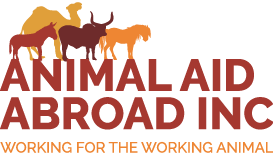Blind Love Working Donkeys Oct Update - Urgent Care, Community Support and a Rescued Baby Donkey
October was a month of great progress and hard work in the donkey-owning community, thanks to kindness and donations from our wonderful supporters.
From outreach activities to emergency veterinary care, a lot was accomplished, highlighting the ongoing need for additional funding to provide crucial medical assistance to donkeys in need.
Outreach Activities – A Month Filled with Care and Support
On the 25th of October, the team held their monthly outreach, which had been postponed due to the tragic loss of a local donkey owner. The outreach went ahead in a spirit of solidarity and care, with 18 donkeys attending. Each donkey received a thorough health check, and their details were recorded. Harnesses were carefully inspected and adjusted, and another six humane harnesses were distributed, bringing the total number of harnesses provided this year to over 75.
Encouragingly, no serious injuries were noted, with only minor rubs from ill-fitting straps and no open wounds.
A donkey suffering from a severe case of mange was treated, and those that hadn’t yet been dewormed received appropriate care. To ensure the donkeys’ comfort, all were treated for ticks and flies.
Looking ahead, the team is combining resources for the November and December outreaches and planning a major event for the first week of December, expecting up to 150 donkeys, a groundbreaking turnout for the program. At this outreach, the team plans to engage with owners about the urgent need for the castration campaign to control the growing donkey population. They also intend to discuss the importance of a donkey-owner identification database to help prevent mass roundups and impounding by the municipality, a threat that has become a pressing concern for local residents.
In preparation, the team aims to sew 20 more harnesses and gather small food hampers for the donkey owners and their families, hoping to create a memorable and impactful event. None of these outreach efforts would be possible without the generous funding from Animal Aid Abroad and its supporters, whose contributions are essential to providing care and support for the working animals.
Additional Activities – Emergency Response and Expanded Veterinary Care
Alongside their regular outreach, the team handled several urgent vet calls, thanks to extra funding. On October 16th, Director Philippa du Toit got a call about a donkey with severe swelling, making it difficult for him to retract his penis. Dr. Annie Mears treated the donkey quickly, cleaning the area and giving him medication, while the owner went home with additional medicine to aid recovery.
Later, on October 30th, Philippa received another call about a donkey with a serious eye injury. After reviewing photos of the injury, Philippa advised the owner to bring the donkey to Dr. Annie, who was doing surgeries nearby. Upon examining the donkey, Dr. Annie found a deep head wound, likely from a machete, with a fractured bone fragment. She performed a procedure under anesthesia to remove the bone and stitch the wound, hoping for a smooth recovery with planned follow-up care.
On the same day, the team continued with planned castrations, performing the procedure on five of the seven donkeys that arrived (two were still too young). This effort is part of an ongoing plan to reduce the local donkey population.
Abandoned Baby Donkey
Another emergency arose when Dr. Annie found a baby donkey abandoned on a road. After waiting 24 hours for the mother, she rescued the foal, who was weak and dehydrated. The baby, about two months old, was brought to the sanctuary for bottle-feeding and has found companionship with another young donkey who recently arrived as a stray.
These cases show the need to control the donkey population in Grahamstown, where roaming donkeys can cause traffic hazards and disrupt public areas.
On October 30th, Philippa met with local officials to discuss plans for managing strays. The team shared their commitment to using castration as a humane option and discussed ideas for identifying donkey owners, such as ear tags or dry ice branding.
Continued Commitment and Community Support
The work in Grahamstown’s donkey community is just beginning, with much more to be done.
The team is encouraged by the growing trust of donkey owners, who are reaching out for veterinary care more frequently. Thanks to the support of Animal Aid Abroad and other donors, the team remains dedicated to improving the lives of these donkeys and creating lasting change.
To everyone who has contributed to our mission to help working animals, thank you. Your support truly makes a difference, one animal at a time.
























